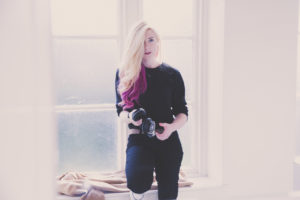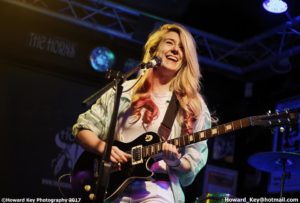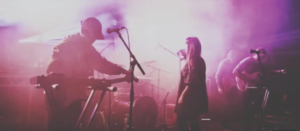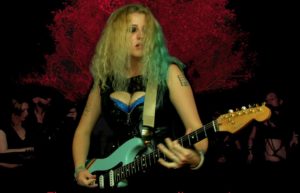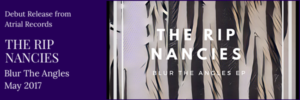
Singer/songwriter Lana White loved to sing to herself from an early age and by the time this Alabama native joined her high school’s show choir, music had become a calling that she wouldn’t give in to and she regarded it as a curse. After graduating from Jackson State University with a degree in exercise science, Lana ran a gym for NASA on the Redstone Arsenal, but the music called her once again and she performed in a duo performing covers as well as being a lead singer in various bands. It wasn’t until Lana had married and tucked away her dreams of pursuing a life of music, that she thought the music curse was finally defeated. While busy raising her family, Lana felt drawn to music again and would write songs she thought no one would hear.
After a few years, Lana had written a number of songs and knew it was time to pursue her dream. She found Dave Anderson (guitarist for Brother Cane and Atlanta Rhythm Section) who would produce Lana’s first professional project, the aptly titled EP “Letting Go”. After marketing herself and seeing some success, Lana met her current producer Randy Younger who has produced several Grammy nominees and winners. Younger has a recording studio on a farm in North Alabama and was searching for an artist to develop when he heard Lana. In 2016, they began writing and recording together and in 2017 they released 3 full-length albums – ‘Better’, ‘Bridge Between’ and her latest one, ‘Beautiful Secret’.
I recently had the opportunity to interview Lana about her latest album ‘Beautiful Secret’, her songwriting process, how her music calling/curse became a blessing, and much more.
Congratulations on your latest album Beautiful Secret that was released in October. Explain the concept or theme of the album and how the idea came about.
The title track “Beautiful Secret” is about letting your life unfold, rather than trying to force fate. That concept is really the umbrella for the other songs on the record too. For example, the line in the song “Mercy”, “I always was at the mercy of others…” is an awakening to my own Beautiful Secret. Realizing that my life doesn’t need to be defined as 100% people pleasing at the utter expense of taking care of myself. If I run out of energy trying to keep everyone else happy and ignore myself in the process, I won’t have any meaningful energy left to give. It is unsustainable, and fuels discontent.
Beautiful Secret was your third album released in 2017 along with Bridge Between, and Better. Explain the strategy behind releasing that many albums in one year.
In our look at the music marketplace that has emerged we see that “content is king!” In the YouTube world, if you are trying to make a sustainable living, you need to be continually publishing new material.
The days of building up to a release and trickling out teasers and doing a lot of time-sensitive promotion seem to be a thing of the past. The attention span of the consuming audience is so short now that we want to be able to provide as much content to them as they are willing to engage with, or even purchase. The more we have out there, the more opportunities we have to engage the audience.
All three of your albums begin with the letter ‘B’. Was that intentional? If so, how are the concepts or themes connected?
That wasn’t planned at the beginning. When we were discussing the title track for the first album, “Better” bubbled to the top because of its strong thematic lyrics and positive message, and it just felt right. Then when we did “Bridge Between” a similar thing happened. After we noticed they both started with the letter B, it became a thing. But it was kind of a synchronicity thing too because we didn’t even know if we would have a “B” song on the 3rd record. As it turned out, when I wrote “Beautiful Secret” pretty early on and then there was no question what the title track would be. That said… the pattern will be broken for the next album, which we believe will be entitled “It’s Not Over Yet.”
Explain how you found Dave Anderson (well known for being the guitarist for Atlanta Rhythm Section and Brother Cane) who produced your debut EP, “Letting Go”.
When I finally decided to go into the studio for the first time, I put the word out in my town of Huntsville Alabama to see if anyone could recommend a producer. Everyone kept responding with Dave Anderson’s name. I had not gotten in touch with him yet, but while I was searching for a studio, I came across Sound Cell, and it turned out that Dave was a partner there. It seemed like fate was guiding me that way, and I met with and hired Sound Cell and Dave Anderson to produce my first EP “Letting Go.”
I really give Dave a lot of credit for encouraging me and nurturing me as a new recording artist, and he did a wonderful job with the album.
You marketed “Letting Go” yourself and saw some success. How did you market it and what kind of success did you achieve?
I should explain that we pulled “Letting Go” off of the shelves because it was really intended as my toe-in-the-water experiment. I was very serious about the project and getting going as a recording artist, but my goals during that project were significantly different than those with the 3 LPs. We are reworking all of those songs and releasing one or two on each new LP until we have released them all. I think we are planning for two of them on the next album.
As for market success, since it was my first effort in trying to understand how the self-made indie artist world worked, it only had modest success. However, it had enough that I realized this was viable for me, and not just a flight of fancy. It really helped me get my arrow pointed in the right direction!
How did your current producer Randy Younger (who has produced several Grammy winners and nominees) find you? What made you decide to become a songwriting team?
After I had released “Letting Go,” I began to contemplate my next steps. I knew they were to continue this, but I wasn’t sure exactly what path I would take. I was leaning toward just putting more songs together and repeating the process. Then, I got a message on Twitter one day from this Randy Younger guy asking me what I thought my next steps were. He then indicated that he was a reputable producer, and he and I had a number of friends in common and he encouraged me to thoroughly vet him, and then if I was interested in talking we should talk. I did, and we did.
When we met, he told me that he had been working in artist development for a little while and had built a studio in North Alabama and would like to try and develop someone locally if possible. He said that he was looking for someone that wanted to make real LP records like the old days with an eye toward writing and recording songs that would last, but not just songs, whole albums that people will want to drink in as a complete work.
He then offered to partner with me straight down the middle and said that I could have as much studio time as I wanted as part of the partnership. He then asked me to take a couple of days to think about it, and after thinking about it for a few days, I accepted. The out for both of us would simply be if it wasn’t working, we would let it go. It has been about a year and a half now, and we have a very inspired and excellent complementary workflow and working relationship.
As for writing together, Randy has been writing for years and has written with and produced several well-known artists. His style and my style are truly synergistic. Finding a writing partner is such a delicate thing and it either works or it doesn’t. We are really fortunate that it does for us.
Explain your songwriting process.
The process can vary, as I’m sure it does for a lot of songwriters. Usually, I will be thinking and a phrase like “peaceful indifference” will pop into my head. When that happens, I will use that idea as my “North Star,” and begin to describe all of the possible things that phrase can mean. When doing that, I try and think of images and poetic devices and then capture those ideas from a personal perspective. I do use a lot of metaphor and simile in writing. I try to paint a picture about the subject with words. I am less of a conversational or storyteller writer.
Randy and I also keep our notes apps up on our phones and when we are talking, if during the course of our conversation we hear something that would be a good song idea or line, we religiously write it down. Then, when we are co-writing, we always read through all of them to see if any fit the song we are working on. Most of the time, there is at least one line that will fit or the idea itself works and we can tweak it to fit.
As for music, when I have the lyrical idea, I just grab my guitar and begin noodling with chords and the lyrics and somehow the song begins to emerge almost on its own. Then I will make a quick voice demo and send it to Randy and he will begin fleshing out a track. Then I go into the studio and we work more on the track and lyrics together until, viola! Song!
Sometimes Randy will send me a track without any melody or lyrics and I will just start singing to the track and it emerges that way, and sometimes he may even have a starting idea, and I will take that and run with it. But no matter which approach we take, we work and keep working on it together until we both are convinced its right.
You have described “the music curse” that followed you most of your life but you only gave in to it after you raised a family. Why did you think of it as a “curse” and not a calling? If you had given in to it years earlier, what do you think your career would be like now?
Where would I be now if I had started much earlier? Well, I think I may not have had the wisdom or maturity to avoid being taken advantage of. I think I might have been put through the expectation mill and would have been molded to be hyper-sexualized, and objectified. I have always been a strong person, but at an earlier time in my life, I had not trained myself to have any healthy cynicism. I tended to just think the best of everyone without really examining ulterior motives. So, I kind of shudder a little bit to think of where I might be, but my gut tells me it might not have been where I had hoped to be. What I mean by that is that I might have had what appeared to be phenomenal success, but at what personal and emotional cost? If I could take the today me back there I might get looked over because I would not be an easy target. So, in all, like in the first album “Better,” I am letting the journey unfold as it should.
So as for the “curse.” I feel that a calling becomes a curse when it is unanswered. If you are meant to do a thing and you don’t do it, it will haunt you. Hence, curse.
For me, it never left no matter how hard I tried to put it away both mentally and in practice. When the calling began to be answered in earnest, the curse really manifested as a blessing.
Explain your experience running a gym at NASA on the Redstone Arsenal.
After I graduated from Jacksonville State University with a B.S. in Exercise Science, I moved to Huntsville and eventually took a job at Huntsville Hospital working at the wellness center there. A person from the NASA (Marshall Space Flight Center) wellness center also did some work at Huntsville Hospital and said I would be perfect for the NASA center. One thing led to another and I eventually got the job running the wellness center and doing all sort of really rewarding things like delivering health and wellness lectures to the NASA staff. I was able to travel some, and it all was an amazing life experience.
I read that you are also a personal trainer. How do you manage being both a personal trainer and a musician?
I have two elementary school aged boys that I stayed home with all through pre-school and into elementary school. When they began to go off to school, I had time during the school day to begin taking on personal training clients. So I have classes in the morning, and then go into the recording studio and work from 10:30 AM to 2:30 PM during the weekdays. It is how we manage to be prolific. It is literally our day job. We also rehearse our live set at the studio most days so we are always ready to play.
Why did you and your producer believe that the music industry was ailing and had a diminished landscape after meeting with major labels and publishing companies? How is it more advantageous to stay an indie artist than to sign with a major label company?
Simple… music is free now. At least that is the perception of the general audience. No industry can thrive if their primary product is, for all intents and purposes, free. So, it is clearly ailing. People aren’t buying physical CDs anymore, and vinyl is a kind of specialty product. Digital download sales are being killed by streaming.
So in meeting with labels, some things became crystal clear. 1. Labels help those who help themselves. The first question out of a major label executive’s mouth to us was “What is your social like?” Well, that seemed like an interesting question because they have the power to promote and “break” an artist right? So why that question? Well, it seems as though the answer is, we want artists that have already done the heavy lifting and proven that they are a thing. 2. The path to radio is all but gone. Since the purpose to sign with a label for us would not be to produce music, but rather to get it distributed and marketed to radio (a dying industry in itself), and since terrestrial radio is so heavily syndicated now and only the chosen few are getting spins, it would be a long shot at best even if we were signed.
Randy has worked with a number of big name signed artists, many of which are no longer signed, and knows from all indicators that the old model is essentially dead. So, why would we give up a huge percentage of ownership to get a slim chance at radio? We wouldn’t and we won’t.
Now we get all of the profit from everything we sell. We utilize social media to elevate awareness about the music and to meet new people. That has led to so many opportunities that would have traditionally come through the label or management, but that is all bypassed now. We own the relationships that we make, and that gives us more power over our own destiny.
We also have the luxury of controlling our own artistic content and deciding where we are going to focus our marketing efforts. We don’t have to pay someone to do what we can do ourselves.
What do you think about producing your own albums in the future?
“If it ain’t broke, don’t fix it!” We have a great established workflow much like Jeff Trott and Sheryl Crow. Ironically, Randy met Jeff last year, and I met Sheryl, which were high points for both of us! We are about 75% done with the 4th album and it should be out this Spring. Then we will make another, and another, etc..
What do you think are the challenges that women face in the indie music industry? How can women be supported more?
We, women, need to also really work together. I always see men from several different bands in town get together at local venues and play together. I don’t think I have ever seen that from female-led groups. Whatever happened to things like Lilith Fair? I would love to see all women-led group festivals. We should be working together, and not viewing one another as competition. We can lift each other up constructively, and we should be intentional about doing so.
What advice would you give to women pursuing or wanting to pursue a career in music?
I say pursue a passion in music. If you have the curse, then you will know that pursuing the passion can be fulfilling and a really rewarding means of answering your calling. But, if you are seeking fame and fortune, I view that as different than pursuing your calling. If you do music to share your art and your passion with others, then it is about what you give, not what you get.
If that’s you, then I say do your best to level your expectations with reality. Also, define what success means to you. If you get a comment on your song from a stranger that it affected their life in some meaningful way, you and are thrilled and fueled by that; then that IS success! I am not saying set your bar low. I am saying, point your arrow in the right direction for the right reasons and aim it high!
What projects are you working on for 2018?
We have 7 songs for our next 10 song LP either completed or very near completion. We think we know what number 8 is, but we have 2 to write from scratch. We plan on releasing that project “It’s Not Over Yet” in mid to late Spring of 2018.
What are your tour plans for this year?
We are not touring in the traditional sense this year. We are playing specific selected dates in various places.
On February 3rd, we are featured guest for a live show on the Grinders Switch Hour on 96.7FM (Kix 96) in Centerville Tennessee, which is about 45 minutes out of Nashville. It is also Minnie Pearl’s hometown. It is a very quaint and cool place and Blake Shelton lived in that town for a number of years. Lots of Opry stars have played on the Grinders Switch Hour, so it is a really cool opportunity.
Thank you, Lana, for the opportunity to interview you!
Get a copy of Lana’s albums on her new website
Follow Lana on Social Media:
Facebook: lanawhitemusic
Instagram: @lanawhitemusic
Twitter: @Lana_White_
Check out Lana’s YouTube Channel
